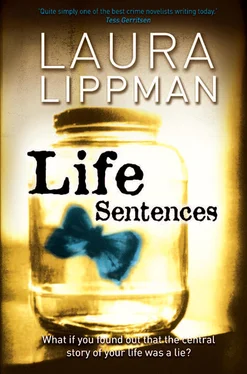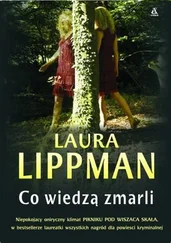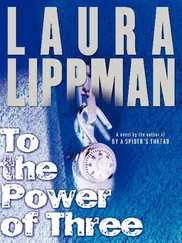To which, I am told, I answered, although not in a recognizable language. I babbled; I circled my pudgy baby arms wildly, trying to simulate the motion of the car. I patted my head, attempting to describe the headwear of the various blue-and yellow-suited men who had come to our rescue. I even did a credible imitation of a siren. Within twenty-four hours, my words came in, like a full set of teeth.
‘And from that day forward,’ my father always says at the end—‘From that day forward’—he is a great one for repeating phrases, for emphasis—‘from that day forward, no one could ever shut you up.’
From My Father’s Daughter by Cassandra Fallows, published in 1998 and now in its nineteenth printing.
BRIDGEVILLE February 20–23
‘Cassandra Fallows? Who’s she with?’
Gloria Bustamante peered at the old-fashioned pink phone memo the temp held out with a quavering hand. The girl had already been dressed down three times today and was now so jangly with nerves that she was caroming off doors and desks, dropping everything she touched, and squeaking reflexively when the phone rang. She wouldn’t last the week, an unusually hectic one to be sure, given all the calls about the Harrington case. Too bad, because she was highly decorative, a type that Gloria favored, although not for the reasons suspected by most.
The girl examined her own handwriting. ‘She’s a writer?’
‘Don’t let your voice scale up at the end of a declarative sentence, dear,’ Gloria said. ‘No one will ever take you seriously. And I assume she’s a writer—or a reporter—if she’s calling about Buddy Harrington. I need to know which newspaper or television program she reps.’
Gloria’s tone was utterly neutral to her ears, but the girl cowered as if she had been threatened. Ah, she had probably hoped for something far more genteel when she signed up at the agency, an assignment at one of those gleaming start-ups along the water. Arriving at Gloria’s building, an old nineteenth-century town house, she would have adjusted her expectations to something old-fashioned but still grand, based on the gleaming front door and restored exterior, the leaded glass and vintage lighting on the first two floors.
Those lower floors, however, were rented to a more fastidious law firm. Gloria’s own office was on the third story, up a sad little carpeted staircase where dust rose with every step and the door gave way to a warren of rooms so filled with boxes that visitors had to take it on faith that there was furniture beneath them. ‘I want prospective clients to know that every one of the not insignificant pennies I charge goes to their defense, not my décor,’ Gloria told the few friends she had in Baltimore’s legal community. She knew that even those friends, such as they were, amended in their heads, It’s not going to your wardrobe or your upkeep, either . For Gloria Bustamante was famously, riotously, deliberately seedy, although not as cheap with herself as she was with her office. The run-down heels she wore were Prada, her stained knit suits came from Saks Jandel in DC, her dirty rings and necklaces had been purchased on lavish trips abroad. Gloria wanted people to know that she had money, that she could afford the very best—and could afford to take crappy care of the very best.
The girl stammered, ‘N-no, she’s not a journalist. She wrote that book, the one about her, um, father? Father . I read it for book club? I mean, I did, I read it for book club.’
‘Pretty young girls go to book clubs? I thought those were for ugly old broads such as me. Not that you’ll catch me in a room full of women, drinking wine and talking about a book . Drinking, maybe.’
The girl’s eyes skittered around the room, trying to find a safe place to land. Clearly, she was unsure if she was obliged to contradict the inescapable truth of Gloria’s appearance or if she should pretend that she hadn’t yet noticed that Gloria was old and ugly.
‘It was a mother-daughter book club,’ she said at last. ‘I went with my mom.’
‘Thanks for the clarification, dearie. Otherwise, I might think you went with your prepubescent daughter, conceived, in the great local tradition, when you were a mere middle schooler.’
The girl took a few steps backward. She had that breathtaking freshness seen only in girls under twenty-five when everything—hair, eyes, lips, even fingernails—gleamed without benefit of cosmetics. The whites of this girl’s eyes were more startling to Gloria than the light-blue irises, the shell-pink ears as notable as the round, peachy cheeks. And she had the kind of boyish figure that was increasingly rare in this era of casual plastic surgery, when even the thinnest girls seemed to sprout ridiculously large breasts. Gloria remembered the tricks of her youth, not that she had ever bothered with them, the padded bras, the wads of Kleenex. They had been far more credible in their way than all these perky cantaloupes, which looked, in fact, as if they had been molded with very large melon ballers. Real breasts weren’t so round . She hoped this girl wouldn’t tamper with what nature had allotted her.
‘I grew up in Ruxton?’ the girl said, and it was clear that she intended the well-to-do suburb to establish that she was not the kind of girl who had a baby at age twelve. Oh, you’d be surprised, dearie , Gloria wanted to say. You’d be shocked at the wealthy families who have sat in my office, trying to decide what to do when one of Daddy’s friends—or Daddy himself—has helped himself to an underage daughter. It happens. Even in Ruxton. After all, Buddy Harrington happened in a suburb not that far from Ruxton .
‘I’m sure you did,’ Gloria said. ‘So Cassandra Fallows wants to write a book about Buddy Harrington? She must be one of those true-crime types who specialize in whipping books out in four to six weeks. We’ll give her a wide berth.’
Buddy Harrington was, as of this third full week in February, being held responsible for 80 percent of the murders in Baltimore County this year. Granted, the county had only five homicides so far, as compared to the city’s thirty or so. Still, Harrington was charged with four of them—his mother, father, and twin sisters, all shot as they slept. The sixteen-year-old had called the police on a Thursday evening two weeks ago, claiming to have discovered the bodies after returning home from a chorale competition in Ocean City. He had been charged before the day was out, although he had yet to confess and was pressing Gloria to let him tell his story far and wide. She was holding him back precisely because of that eagerness, his keenness to perform. For Buddy Harrington was not the kind of boy who inspired the usual descriptions of those who snap—quiet, introverted. He was an outstanding student, a star athlete, and a gifted singer, well liked by classmates, admired by teachers. The community was stunned.
Gloria, who had spent several hours with Buddy since his arrest, was not. She also knew that all the things that Buddy considered his assets—his good looks, his normalcy—would undercut him. Nothing terrified people more than an all-American sociopath. And until—unless—she got Buddy into the juvenile system, she had to keep him from tainting his future jury. Which would not, of course, be a jury of his peers, but a dozen middle-class mothers and fathers who would be undone by his poise, his composure. Especially—shades of O.J.!—if he stuck to this help-me-find-the-real-killer scenario.
‘No, it’s not about Buddy. She wants to ask you about an old case?’ The girl squinted at her own handwriting. ‘Something about a calley-ope?’
Читать дальше












